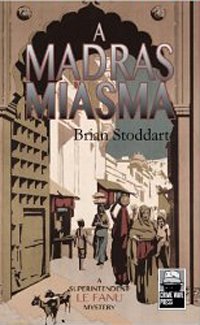Professor Brian Stoddart is a distinguished Australian academic who has been Vice Chancellor of Latrobe University, Victoria, and is a widely respected non-fiction author. He’s especially interested in the role of sport – and, in particular, cricket – in Australian culture. Now, he has turned his hand to crime fiction with two very well-received novels set in post-WWI India, which feature a maverick English policeman, Superintendent Christopher Le Fanu. We reviewed A Madras Miasma here, and decided to invite Prof Stoddart onto the site for an interview…
Give us a brief biography of Le Fanu: What is his background? Did he have ‘a good war’? What about his personal life?
Le Fanu had a good war in that he survived, and served well which was, in a sense, the conventional view for the officer class where the casualty rates were so high in World War I. He won a Military Cross. But it changed him, as it did so many. In the physical sense, he still suffers nightmares and elements of what might have then been called shell shock and now post traumatic distress disorder. That is manifest in his phobia about blood, an awkward problem for a murder investigator required to attend autopsies.
Over the first two books we learn that his father would rather have been an academic than a schoolteacher, and expected his son to at least join the elite Indian Civil Service, and was seriously displeased when Le Fanu set himself for the police. So Le Fanu goes to Madras as something of a loner, makes a bad marriage that the war turns into a divorce, and when we first encounter him he is in a relationship with his housekeeper, Roisin McPhedren who is Anglo-Indian. That is, she is mixed-race in a social setting where such relationships are anathema to the establishment.
Le Fanu is an able policeman but an awkward person, and that is aggravated by his war experiences in which he comes to learn a lot more about the Indians under his command. This gives him a greater sympathy for the activities of the Indian National Congress and Mahatma Gandhi. Those views also set Le Fanu for clashes with many but not all his colleagues.
Le Fanu has a wonderfully resonant name. Are you a fan of the Irish author Sheridan Le Fanu, or did it just sound right?
There are a few strands here. Henry Le Fanu was a member of the ICS in Madras in the later 19th century, retired in 1900 and went to serve the Nizam of Hyderabad. He was the nephew of Sheridan Le Fanu, the great horror writer, and brother to another Le Fanu who became Anglican archbishop in Australia. Yet another brother was Victor who was a Cambridge rugby blue and went on to be an early Irish star. So there was some evocation there. The name was right because I wanted to get difference into the character, in the cultural sense, to set him up as a lightning rod. So Le Fanu the policeman really draws on an extensive heritage!
Le Fanu places a great deal of faith in the methods of someone called Hans Gross. Who was he?
Hans Gross was an Austrian researcher regarded widely as one of the pioneers of modern criminal investigation methods, and his Criminal Investigation and later Criminal Psychology were taken up around the world from the later 19th century onwards having proved successful in his home country. I discovered that, early in the 20th century, two European lawyers based in Madras produced an Indian edition of Gross, and that gave me the idea of introducing another element into the crime books: the tension between old and new approaches to analysis in the middle of changing social and political contexts.

Your descriptions of India are vivid, and readers can virtually taste and smell Madras. Are you an old India hand?
That the answer yes is probably apparent already. I did a PhD on modern Indian nationalist politics and spent a lot of time in India as well as researching the period. So I have been coming and going to India for a very long time, and it is one of those places that you know enough to know that you need to know a lot more. The crime series give me the chance to tell some stories in a way that is not so easy to do in a non-fiction sense, but they also allow me to capture a lot of atmosphere. The books are set firmly in a historical and physical context so I try hard to get all that right.
Le Fanu has very modern values in regards to race and gender. They contrast sharply with many of the Europeans around him. Are there dangers in portraying values which prevailed almost a century ago, through a 21st century lens?
Yes, there are, clearly, but one of the aims here is to show that there were, in fact, people in the Raj who were more progressive than others. In the mid-1920s in Madras, as I mention in the novels, another ICS man called Hilton Brown, who was also a writer, produced a couple of novels that seriously questioned the imperial project. Similar mavericks appeared all over India. Le Fanu, then, reflects an alternative strand that was present in the Raj, but he does also have a streak of humanity that is timeless, hopefully.
Given your love of cricket, is there any chance Le Fanu might cross paths with the great Indian batsman Ranjitsinhji?
Ranj is a fascinating character and even though there have been some good new biographies there is probably still much to tell. In truth, he was a very poor administrator of a very minor princely state, but his profile allowed him an international role, at the League of Nations, for example. I had not thought about him appearing, but there is time yet! The cricket dimension allows, of course, for other social commentary because in south India, as elsewhere, the early struggle was for Indians to get access to the game which was a ruling elite preserve. As the books grow, this sort of dimension will shift as well. At least, that is the present intention. As for many writers, for me the characters and the stories sometimes take over!
You are working on a third Superintendent Le Fanu mystery. Can you give us a hint of what he will be up to?
Yes, the third one is now underway. Le Fanu is Acting Inspector-General, the top cop as it were, and finds it less satisfying than he thought, so he is struggling with that. His relationship with Ro McPhedren is also in evolution, and again not as smoothly as he would like. The political changes in Madras continue to intrude on all this and make his life more complicated, and possible changes in local Raj leadership add a further element – he might just lose a couple of his strongest supporters. Amidst this, an ICS officer goes missing from a district in the Madras Presidency, and that sets off a chain of events that send Le Fanu to some different locations and make him experience some different tests.










